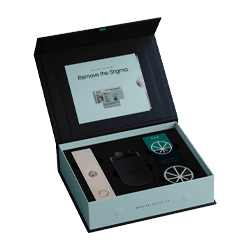CECD: Clinical Endocannabinoid Deficiency
As its name would suggest, people living with Clinical Endocannabinoid Deficiency do not produce the same levels of endocannabinoids as those without CECD.
Our bodies naturally produces endocannabinoids to interact with different receptors in our bodies, including those that make up the endocannabinoid system, to promote homeostasis and keep us healthy. Having in insufficient level of endocannabinoids, or having Clinical Endocannabinoid Deficiency, can lead to complications and has been theorised to play a role in certain health conditions such as fibromyalgia, irritable bowl syndrome, and migraines.
What are endocannabinoids?
Endocannabinoids make up one part of the endocannabinoid system. They can interact directly with cannabinoid receptors in our bodies, specifically CB1 and CB2 receptors. When endocannabinoids bind with the ECS receptors, they help to regulate various physiological functions such as mood, appetite, pain, and inflammation.
What is the endocannabinoid system (ECS)?
The endocannabinoid system is the largest neurochemical system in the human body. It is made up of endocannabinoids, receptors, and enzymes that work together to maintain balance and promote homeostasis, or balance, within the human body.
What is the difference between endogenous cannabinoids and cannabinoids sourced from cannabis?
Endogenous cannabinoids, also known as endocannabinoids, are produced naturally in the human body. Cannabinoids sourced from cannabis plants, also known as phytocannabinoids, can be administered through ingestion or inhalation and interact with our ECS receptors to produce similar effects.
To find out more about CECD, click here
If you would like to learn more about medical cannabis in the UK, Releaf is here to help.

